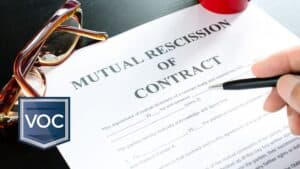For decades now, millions of consumers have been talked into spending tens of thousands of dollars on a weekly timeshare vacation. While some are content with a simple trip to a familiar destination, others become consumed by efforts to make the purchase worthwhile. Whether lust or disappointment drives the pursuit, the timeshare sales system is built to take advantage of both. Over the past few weeks, we’ve talked a lot about the sales process and how buyers are misled. But the way timeshares get away with lying is just as concerning.
In order to understand this better, it’s important that we remain focused on the contract signing. Oftentimes disputes by a vacation owner stems from the initial presentation. This is because actual contract terms are rarely disclosed, causing many buyers to sign perpetual agreements under false pretenses. In other words, sales teams have been known to lie in order to place unsuspecting consumers under a legal obligation they don’t exactly understand.
Lying About Timeshare Ownership is Getting Worse.
In the past, getting out of a timeshare agreement has often been viewed as an unattainable feat. This is due to the amount of money poured into the sale of the contract. But over the past few years, people have started noticing that timeshares get away with lying more often than not. In return, consumer protection and government agencies increased their efforts to expose misleading sales practices and crack down on unethical timeshare operations.
Soon after, companies like ours began publishing industry truth to combat the deceit. Because of this, many major timeshare resorts have focused their efforts on additional ways to get away with lying. When you think about it, providing proper disclosure and an adequate follow through would solve a majority of their problems. But apparently, they’re more concerned with protecting themselves from backlash right now – while keeping owners under contract.

“License to Lie” Clause Created to Protect Timeshares.
In last week’s article, we briefly covered a clause that is commonly being used in timeshare contracts today. Visible on most written agreements, this “license to lie” purportedly gives timeshare companies the “right” to disqualify any “verbal promises” made by a timeshare salesperson during the sale. These clauses are written in a way to protect the timeshare from any type of legal complaint regarding the presentation.
Although this is currently in play, we’re not sure how they plan on enforcing it. Many prospects aren’t even allowed to view the contract until the sale is final. So if the purchase is based on a lie, then how can a buyer’s obligation be binding? The simple fact that prominent resorts are trying to legally protect themselves from being held accountable for false promises made by their own sales teams is absurd! Even more important, how can timeshares get away with lying when they’ve already been busted for singing the same tune?
Lying About Timeshare Contracts is Nothing New.
There’s a reason why timeshare companies use highly aggressive sales teams. Anyone with sense can see the intent here is to maximize their bottom line at the consumer’s expense. Extra effort has always been made to blame buyers for their ownership experience. Timeshares have their hands deep in lobbyist’s pockets to ensure lawmakers enforce short rescission periods and uncapped annual fees. The state of Florida recently increased the cap for special assessments. Even customer service teams are trained to make buyers feel responsible for the inconvenience of the purchase.
The never ending sales process, that’s jam packed with excuses, helps timeshares get away with lying and deflect any wrongdoing. The thing is, the problem still remains. The more owners they lie to, the more problems they have. Contractually forcing them to pay is not the answer. If anything, the license-to-lie clause will only make matters worse for resorts and their timeshare programs. Refusing to revise sales strategies and show empathy to a number of wronged customers is not a good look.

Timeshares Find A Way to Keep Owners at Bay.
Government officials are either oblivious to the timeshare industry’s deceitful schemes or they’re benefitting from them. What makes this “license to lie” situation interesting is the California Attorney General recently sued a well-known timeshare group for it. But after the operation settled with the AG and removed the disclaimer from their contracts, they simply repositioned themselves under a successor company.
Doing so allowed them to create new contracts with the exact same clause – and it’s being leveraged still to this day. Powerful hotel chains know that government agencies just don’t have the funds or manpower to continue fighting the same battles. Since the first settlement took years to execute, they apparently feel it’s worth the risk to do it again. It’s almost as if beating the system makes them feel accomplished.
The current use of the disclaimer against new owners gives the resort enough ammunition to quietly continue selling contracts and collecting payments. The losses from COVID-19 have added even further urgency and aggression to their sales tactics. And like we mentioned before, timeshares get away with lying because a majority of the general population isn’t aware of the actualities of the purchase – or what to watch out for during the sale.

Are Travel Enthusiasts At a Disadvantage?
Rarely are people ever prepared or even motivated to properly document a timeshare presentation in order to protect themselves from sales fraud. Oftentimes, many feel as though they’ve stumbled across an opportunity of a lifetime. The charisma of the sale can be captivating. This is why all aspiring vacation owners should always have an attorney review the terms before signing anything.
Even a simple mention of this during the presentation can work in the buyer’s favor. But it’s hard for most to think this way. Many want the salesperson’s spiel to be true. Instead of challenging any and every promise before committing to the deal, they believe in the pitch. Little do they know that timeshare offers should be viewed with skepticism. Questioning the purchase could be one of the best decisions they ever make.
Timeshares Want Owners to Believe All Sales Are Final.
Travel enthusiasts will continue making ignorant timeshare mistakes until they fully understand the pitfalls of the industry. As buyers progress in ownership, they often have a number of questions about their contract. But once the rescission period is over (usually 5 days) and the agreement is binding, it’s awfully difficult for them to do much about it. As they discover more truth, remorse usually sets in quickly. Timeshare companies know this but many simply don’t care. They know they have leverage.
As long as owners don’t turn to cancellation services or formulate a strong class action lawsuit, resorts know they can milk a vacation owner for tens of thousands of dollars before they even know what hit them. This is why a majority of their news releases and industry updates discuss exit scams. If they can create fear around an owner’s timeshare contract exit resource, they can make a lot of money off of one buyer.

Will Timeshares Get Away With Lying Much Longer?
While the whole concept of lying is disheartening, it tells us that timeshare companies are becoming more desperate than ever before. The simple fact that they’re using old, failed tricks proves they’re running out of options. Society just doesn’t value an annual vacation like once before. Even though many have enjoyed their purchase in the past, the greed of the industry continues to rear its ugly head.
Buyers that were once able to travel effortlessly are now experiencing limitations. Mergers and new laws have added inconveniences to the overall fractional ownership experience. Points programs haven’t exactly been fruitful. Now that the travel industry is extremely competitive, some believe it makes more sense to simply cancel the timeshare. While we’re not quite ready to put a fork in the industry, the future most certainly looks bleak.
When timeshares get away with lying because they’re avoiding the truth, it’s only a matter of time before it bites them. If you feel as though you’ve been misled during a timeshare presentation and want to learn more about our qualifying process, you can always schedule a free consultation. At VOC, we’re committed to understanding your current situation so we can point you in the right direction. Thanks for stopping by.






